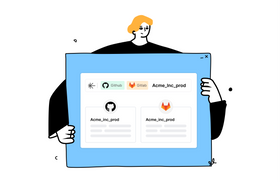6 Key Metrics for Knowledge Management That Actually Matter
Published September 28, 2023

Knowledge management is critical for business efficiency, and most organizations already adopt tools that optimize it. As per a McKinsey report, technologies that make organizational knowledge more accessible can help improve productivity by up to 25%.
In order to have a successful knowledge management strategy, invest in tools that are in line with your organizational goals. Additionally, regularly assess how well the tool is performing in meeting those goals.
Measuring the effectiveness of a knowledge management solution can pose challenges, particularly given the intangible nature of knowledge. This is where knowledge management metrics come in. These are quantifiable measurements that monitor the performance of your solution and demonstrate its ROI.
The Power of Knowledge Management KPIs
When testing your solution's effectiveness, you can monitor these essential knowledge management KPIs.
Usage and Adoption Rates
A knowledge management system is effective when the ratio of active vs. registered users is high. A low ratio can be indicative of issues such as dated content or navigation challenges. Usage patterns will show which topics are most frequently accessed and which search queries lead to dead ends within the current system.
By tracking usage and adoption rates, you can identify gaps and build a system that benefits employees at all levels.
Knowledge Contribution
A key purpose of knowledge management is to foster collaboration through a central database. When employees contribute more, they collaborate better and increase organizational understanding.
Consider how many employees are contributing and the frequency of their contributions. Low contribution indicates a need to retrain your employees on the system or motivate them to share more.
Problem Resolution Time
Slow resolution times indicate that there are either gaps in the knowledge management platform or that it is not user-friendly enough. If a knowledge management system is not reducing the time spent searching for information, it is not performing its duty.
Completing tasks and solving problems becomes much simpler when information is easily accessible within a knowledge management system.
✶ Learn more with a beginner's guide to improving document management
Analytics and Knowledge Management Insights
Knowledge management metrics do not deal exclusively with KPIs. Analytics and knowledge management also intersect to provide more insight into your platform’s functions.
Search Effectiveness
Users can complete their tasks faster when they receive accurate and relevant results from their search query. Naturally, the more effort your employees expend to find the right results, the more likelier they are to consider the knowledge management platform ineffective.
A smart knowledge management platform learns from users’ past behavior to improve the quality of its search results.
Content Rating and Feedback
Your knowledge management platform should facilitate users in providing feedback, which can help enhance performance.
User feedback and ratings are also helpful in creating their profiles, which can be used to personalize their experience on the platform.
Knowledge Gap Identification
To identify any knowledge gaps in your system, you can also utilize user feedback and add appropriate content to fill those gaps.
For this, you can create new material for the organization’s knowledge library or conduct employee training sessions.
How to Measure Knowledge Management
While tracking these key metrics will help you evaluate the effectiveness of your existing solution, you also need to accurately measure knowledge management. Here is how:
- Establish clear objectives: Knowledge management targets are SMART (Specific, Measurable, Attainable, Relevant, and Time-bound). Clearly identifying your knowledge challenges helps you select the most appropriate solution.
- Automation and technology: Effective knowledge management requires compiling and cataloging large datasets. Automation technology like AI is invaluable in organizing and analyzing a large body of knowledge.
- Regular assessment and adjustment: Knowledge management platforms must be flexible and accommodating of changes and additions. Platforms that let you regularly assess and adjust the information allow greater control over your existing organizational knowledge.
Unleash Productivity With Enterprise Search Engines
The future of enterprise search engines is bright, as they are expected to simplify knowledge management like never before. Results can be delivered within seconds with the user-friendly interface. The all-inclusive search function combs through every folder and application in a company's knowledge library, boosting employee productivity and morale.
Unleash, the enterprise search solution for the modern workplace, combines AI-powered recommendations and semantic search capabilities to deliver relevant results, quicker resolution times, and streamlined productivity. It sets new standards for knowledge management with multi-level security and full data privacy. To start, test its performance on key metrics discussed in this article.





